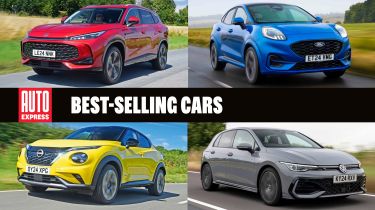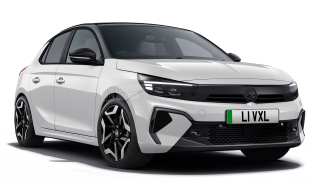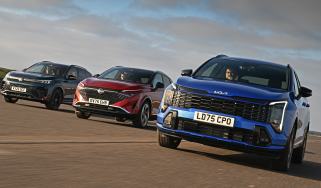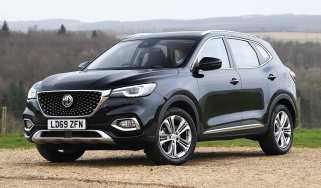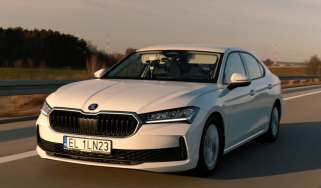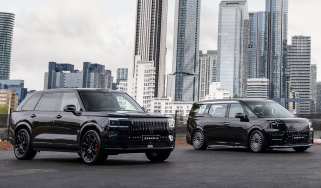Best-selling cars 2025: the year's 10 most popular models
These are officially Britain’s biggest-selling new cars so far in 2025
To earn a spot as one of the UK’s best-selling cars 2025, manufacturers have to appeal to a wide variety of buyers, combining practicality, efficiency and affordability into one package.
From SUVs and family hatchbacks, to small, dinky superminis, knowing which models are amongst the best-selling cars in 2025 can help indicate which manufacturers are at the top of their game and the ones you should consider when buying a new car.
If you’ve been paying attention to this list over recent months and years, the best-selling models so far in 2025 won’t come as much of a surprise. The Ford Puma finds itself in first place yet again, with the Kia Sportage and Nissan Qashqai hot on its heels. It’s not a complete SUV-fest in the top 10, though, with the Vauxhall Corsa and Volkswagen Golf continuing to carry the torch for small cars and family hatchbacks.
If you’re looking to buy a new car then the Auto Express Buy a Car service has plenty of great deals available for you to choose from. Simply tell us what car you’re interested in and let our network of trusted dealers make their best offer. We can also help you sell your old car in the process, too.
How is the new car market performing?
After some time in the doldrums, there’s just a hint that the UK car market is in better health than it has been recently, with the SMMT reporting a 13.7 per cent rise in registrations in September 2025 - the best September since 2020 and the second best month this year.
Overall, the SMMT recorded 312,887 registrations in September, with the Kia Sportage and Ford Puma duking it out at the top of the month’s sales tables, as they have been most of this year. The Sportage came out top with 9,455 units to the Puma’s 8,310, but the Puma still leads overall in 2025, having sold more than 41,000 units since the start of the year.
Most notable though is the arrival of a new nameplate in the top ten: 6,489 examples of the Jaecoo 7 found homes in September, putting it in fourth place behind only the Sportage, Puma, and Nissan Qashqai. The Chinese premium EV squares up to the likes of the BMW X1 and MINI Countryman in the market, but with the basic model starting at under £30,000, has a significant price advantage.
The other big news in September is a boost in EV sales. Helped by the Electric Car Grant, September carried on an increase that started in the previous month, and with 72,779 new battery electric vehicles sold, it’s a new all-time monthly record for EVs. Plug-in hybrid sales also went up, by more than 56 per cent, and combined with an increase in hybrids too, electrified vehicles made up the majority of registrations in September.
Top 10 best-selling cars 2025
Without further ado, here are the UK’s official best-selling cars of 2025 so far, according to data from the SMMT.
1. Ford Puma - 41,531
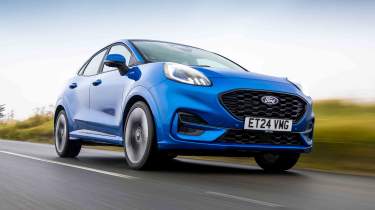
The Ford Puma was the UK’s best-selling car in both 2023 and 2024, and as things stand heading towards the end of 2025, this small SUV is on course to turn this winning streak into a hat-trick, but a lot can happen between now and the end of the year.
It’s not difficult to see why the Ford Puma is one of the best-selling cars currently on sale. The Puma is one of the best cars to drive in its class, it’s good value for money, and a mid-life facelift and the roll-out of the fully electric Ford Puma Gen-E variant make this small car even more appealing. The Puma has its work cut out if it’s to retain its crown as fresh competitors are continuing to arrive at a steady pace.
2. Kia Sportage - 38,734

The Kia Sportage was a frequent sight in the 2024 best-seller rankings, but it couldn’t quite manage to reach the top of the chart. Things are looking much more promising for this mid-size SUV in 2025, with the Sportage topping the charts for the first two months of the year and again in September, and remains well within striking distance of the Ford Puma as things stand.
The latest Sportage offers space, tech and comfort in droves, so it’s pretty easy to see why it continues to prove very popular with buyers. That seven-year/100,000-mile warranty is as attractive as ever, too.
3. Nissan Qashqai - 32,789
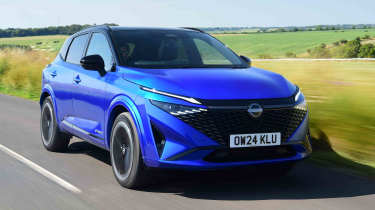
It’s been 18 years since the original Nissan Qashqai first arrived on our streets, and over this time the car has grown into a household name for plenty of drivers.
The latest model is a much bolder offering than its predecessors when it comes to styling, but there’s still an overall sense of familiarity where it matters. While it isn’t quite the top dog in the fiercely competitive mid-size SUV market, the Qashqai clearly still offers enough to appeal to lots of buyers.
4. Vauxhall Corsa - 29,327
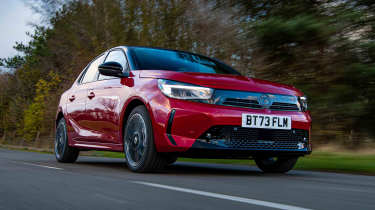
Plenty of UK drivers have experienced at least one generation of Vauxhall Corsa in their lifetime, whether as a passenger, driver or even a learner. Following the demise of the Ford Fiesta, the Corsa remains one of the most recognisable names in the supermini market.
The latest generation offers loads of choice when it comes to trim, kit and powertrains (you can even have a hybrid, or a fully-electric model), and prices start from just under £19,000.
This small car is unlikely to beat the SUVs to become 2025’s best-seller, but it’s still an undeniably strong performer and one of the best superminis money can buy.
5. Nissan Juke - 26,995
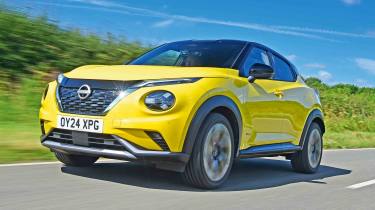
It’s been with us since 2019, but the second-generation Nissan Juke continues to be a steady seller for the Japanese brand.
A mid-life facelift in 2024 has helped this ageing SUV to keep up with its rivals, and its looks are as bold as ever. It would seem that this is enough to keep the Juke in this year’s best-seller charts for the time being.
6. Volkswagen Golf - 25,163
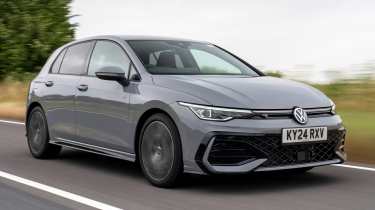
Whether you want a family car, hot hatchback or even an estate car, there’s a Volkswagen Golf to suit your needs.
While the eighth-generation model initially got off to a troublesome start (largely thanks to some irritating tech and haptic buttons), the revised Mk8.5 version has set out to right some of these wrongs. And it would appear that Volkswagen's efforts have paid off because the Golf remains a firm favourite with new-car buyers and a stalwart in the top-10 best-selling cars list.
7. MG HS - 24,104
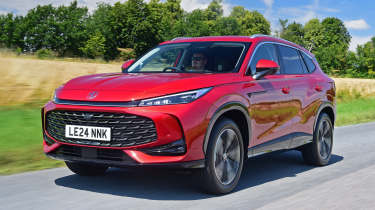
MG is going from strength to strength in the UK and the new MG HS is further proof that cars that are well equipped, spacious, economical and good value for money are a winning formula with buyers. As further evidence, it’s skipped ahead of the Volkswagen Tiguan in this year’s sales since we last updated this list.
The MG HS is available with a hybrid, plug-in hybrid or pure-petrol powertrain, and a competitive starting price of just over £26,000 helps it stand out in a crowded market. This mid-size SUV also comes with a generous amount of kit as standard and is a straightforward family car with a long seven-year/80,000-mile warranty.
8. Hyundai Tucson - 23,729
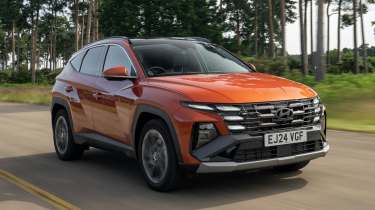
The Hyundai Tucson is a serial winner at the Auto Express New Car Awards and it appears to have impressed plenty of buyers so far in 2025 as well, with sales accelerating since earlier in the year, and bumping the Tucson up the top ten.
Not only does it have striking looks, intuitive on-board tech and a premium-feeling cabin which wouldn’t be out of place on more expensive and high-end models, the Tuscon’s recent mid-life refresh has helped it keep with its rivals.
9. Volkswagen Tiguan - 23,519
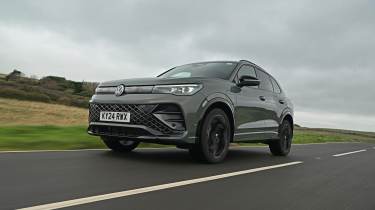
Many people appreciate a no-nonsense approach, and the Volkswagen Tiguan is a pretty solid all-rounder that’s good at ticking many of the essential boxes.
The Volkswagen Tiguan is practical, well built, efficient and feels a bit more premium inside than it actually is. Company car drivers are best catered for by the plug-in hybrid model which, with an all-electric range of up to 77 miles according to VW and low Benefit in Kind tax, should help keep running costs in check.
Latest Volkswagen Tiguan deals
10. Volvo XC40 - 22,940
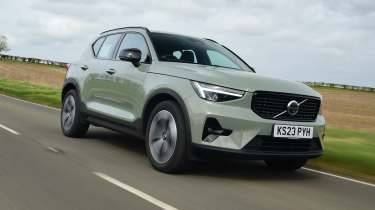
We’ve got a new entrant in the top ten as the Volvo XC40 bumps out the Peugeot 2008 from the final spot. Competitive pricing must be playing a part, as currently a mild hybrid XC40 starts at under £36,000, not just the most affordable model Volvo sells, but also a shade cheaper than other premium small SUVs like the BMW X1 and Audi Q3 – if still more than mainstream alternatives.
The XC40’s also among the more stylish cars in this class, and the interior has an understated style too, while there’s more space than you might expect given the car’s 4.4-metre length. Throw in a stellar reputation for safety and a range of punchy (if not class-leadingly frugal) engines and it’s not hard to see why the Volvo’s become a hit with the UK carbuying public.
Sales vs registrations: inside the numbers
There’s an important distinction to be made where the UK’s monthly and annual ‘car sales’ figures are concerned. Namely, that they don’t actually count the number of cars sold in the sense that many people might expect. The numbers provided by the SMMT are for car ‘registrations’ rather than being sales figures.
When customers buy a new car, it is registered before it can be driven on the road, but cars are also registered by manufacturers and dealers before they have a customer to go to. This practice of processing pre-registered cars is done for various reasons, but often the goal is to move stock through the supply chain, avoiding bottlenecks or to hit targets. It means that a significant proportion of the cars in the figures could be pre-registered, and estimates of how many range between 10 and 20 per cent.
Tell us which new car you’re interested in and get the very best offers from our network of over 5,500 UK dealers to compare.

